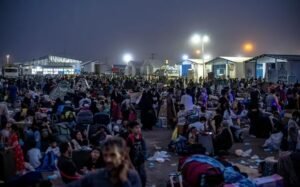02-08-2025
TEHRAN: Ali Ahmad’s eyes fill with tears as he lifts his shirt to show deep bruises across his back.
While he was detained, Iranian officers struck him and accused him of spying, he says. “They used hoses, water pipes and wooden boards to beat me. They treated us like animals.”
 He was speaking to the BBC earlier this month at Islam Qala on the two countries’ border, before crossing back over to Afghanistan. His name has been changed to protect his identity.
He was speaking to the BBC earlier this month at Islam Qala on the two countries’ border, before crossing back over to Afghanistan. His name has been changed to protect his identity.
Iran which says it hosts more than four million undocumented Afghans who fled conflict in their homeland has been stepping up deportations for months. In March those without papers were given a July deadline to depart voluntarily, but since a brief war with Israel in June, the authorities have forcibly returned hundreds of thousands of Afghans, alleging national security concerns.
Daily returns peaked at about 50,000 people in early July, according to the United Nations often after arduous journeys.
Ali Ahmad says Iranian officials confiscated his money and phone and left him without “a single penny to travel back”. He’d lived in Iran for two and a half years.
‘Scapegoats’
Iran’s crackdown has coincided with widespread accusations linking Afghans to Israel’s intelligence agency Mossad, including Iranian media reports that cite police sources claiming some individuals were arrested for espionage.
“We’re afraid to go anywhere, constantly worried that we might be labelled as spies,” one person, who wished to remain anonymous, told BBC News Afghan.
“You Afghans are spies”, “You work for Israel” or “You build drones in your homes”, are other frequent accusations, according to this individual.
 Barnett Rubin, an expert on Afghanistan who served as senior adviser to the US Department of State, says Tehran may be “looking for scapegoats” for its shortcomings in the war against Israel.
Barnett Rubin, an expert on Afghanistan who served as senior adviser to the US Department of State, says Tehran may be “looking for scapegoats” for its shortcomings in the war against Israel.
“The Iranian government is very embarrassed by their security failures”, which show Iran “was very thoroughly penetrated by Israeli intelligence”, he says.
“So they had to find someone to blame.”
Critics also say the accusations of espionage are aimed at buying legitimacy for the government’s plan to deport undocumented Afghans.
The BBC attempted to contact the Iranian government but did not receive a response. The return of Afghan refugees “without tension and with respect for human rights… is a goal pursued at all levels”, the state-backed Islamic Republic News Agency said on 18 July.
‘Four days, like four years’
Abdullah Rezaee, whose name has also been changed, has a similar story to Ali Ahmad.
At the detention centre where he was held, about 15 Iranian officers physically harmed him and other deportees, Abdullah told the BBC at Islam Qala.
“Iranian police tore up my visa and passport and beat me severely. They accused me of being a spy.”
Abdullah says he’d only been in Iran two months before being detained, despite having a visa.
“They beat us with plastic batons and said: ‘You’re a spy, you’re ruining our country’.”
The four days he was detained “felt like four years”. He describes constant mistreatment, physical abuse and lack of food. (BBC)
 Pressmediaofindia
Pressmediaofindia




